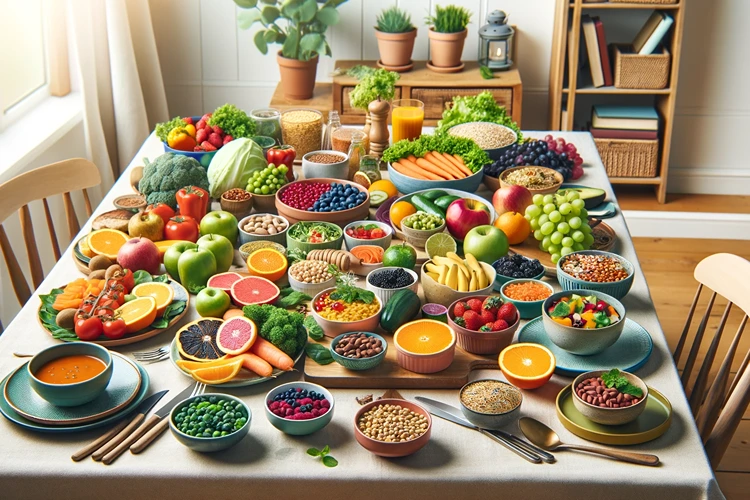Struggling to maintain a vegetarian diet on campus? You’re not alone. Adopting a vegetarian lifestyle in college presents a mix of benefits and challenges. This guide delves into vegetarian meal planning for college students, highlighting ways to sustain a diet abundant in fruits, vegetables, and whole grains. It covers navigating dining options and securing nutritional completeness without meat, providing key strategies for flourishing on a plant-based diet amid the rigors of academic life.
Why Focus on Balance?
Before diving into the “how,” let’s talk about the “why.” A balanced diet is crucial for everyone, especially vegetarians. It ensures you’re getting all the necessary nutrients to fuel your brain and body. But what does balance really mean for a vegetarian college student? It’s about variety, nutrient density, and smart choices. Let’s break down the components of a balanced vegetarian diet that supports both your academic and personal life.
Understanding Nutritional Needs
First off, knowing what your body needs is the foundation of meal planning. Vegetarians should focus on protein, iron, calcium, omega-3 fatty acids, and vitamins B12 and D. Each plays a vital role in your health. For instance, protein is essential for muscle repair and growth, while iron carries oxygen to your cells. Let’s explore how to meet these needs through a vegetarian lens.
The Benefits and Challenges of a Vegetarian Diet for College Students
Pros
- Enhanced nutrient intake from fruits, vegetables, and whole grains.
- Lower risk of chronic diseases such as heart disease, diabetes, and certain cancers.
- Supports environmental sustainability by reducing the carbon footprint associated with meat production.
- Promotes weight management and a lower body mass index (BMI) due to a diet lower in calories and fat.
- Increases longevity, with studies linking vegetarian diets to longer life spans.
Cons
- Potential for nutrient deficiencies if not properly planned, especially in iron, vitamin B12, and omega-3 fatty acids.
- Can be challenging to find diverse and satisfying options in some restaurants and social settings.
- May require extra effort to maintain balanced nutrition and variety in meals.
- Social dining experiences may be limited due to less availability of vegetarian options.
- Initial transition period can be difficult for those used to meat-centric diets, with potential cravings and adjustments.
Navigating the Dining Hall
The dining hall can be a minefield or a goldmine for vegetarian students. Here’s how to make it the latter. Start by scanning for the vegetarian label, but also get creative. Look beyond the obvious choices. Salads and veggie burgers are great, but there’s so much more. Combine sides to create a balanced plate or ask the chef if there’s a vegetarian option behind the scenes. Don’t be shy; your dietary needs are important.
Helpful Hint:
Most dining halls are equipped to accommodate various dietary needs. If you can’t find vegetarian options that appeal to you, request a meeting with the dining services to discuss your needs. They can often provide insights or adjust their offerings.
Stocking Your Dorm Room
Having a well-stocked pantry is half the battle. Focus on non-perishable items that you can turn into meals in a pinch. Think whole grain pastas, rice, beans, lentils, nuts, seeds, and a variety of spices. These staples can be the base for countless recipes. Also, invest in some quick-cook or microwaveable grains and legumes for those late-night study sessions.
Quick and Easy Recipes
Wondering how to keep your vegetarian meals exciting without spending hours in the kitchen? You’re in luck! Here are some simple, tasty recipes to add to your rotation. They’re perfect for when time is tight but you’re craving something wholesome.
One-Pan Magic: Stir-Fry
One-pan stir-fry is a lifesaver for busy evenings. Here’s how to make it a balanced meal:
- Start with frozen mixed veggies for convenience and variety.
- Add tofu for a protein boost. Pressing it first makes it extra crispy.
- Use a splash of soy sauce or tamari for flavor. Sesame oil can add an extra layer of taste.
- Serve over brown rice or quinoa for a complete meal.
This dish is not only quick to prepare but also packed with nutrients.
Breakfast Made Easy: Overnight Oats
For a no-cook breakfast option, overnight oats are unbeatable. Customize them to fit your taste:
- Mix rolled oats with almond milk or any plant-based milk of your choice.
- Add chia seeds for omega-3 fatty acids and fiber.
- Top with your favorite fruits, nuts, or a dash of cinnamon.
- Let sit in the fridge overnight, and enjoy a hassle-free morning meal.
This breakfast is both nutritious and satisfying, giving you the energy to start your day right.
Lunch on the Go: Veggie Wraps
Need a quick lunch that’s easy to carry? Whole grain wraps are your best friend. Here’s a simple way to make them delicious:
- Spread hummus on a whole grain wrap for a creamy base.
- Add a variety of fresh veggies like bell peppers, cucumbers, and spinach.
- Include sprouts for a crunch and a nutritional punch.
- Roll it up, and you’re good to go!
These wraps are versatile, portable, and provide a balanced mix of macros and micronutrients.
Why are these recipes perfect for you?
Each recipe is designed with a busy college lifestyle in mind. They require minimal ingredients and kitchen equipment, making them accessible for dorm living. Plus, they’re easily customizable to suit your taste preferences and nutritional needs. Whether you’re in a rush, on a budget, or simply looking for something nutritious and delicious, these recipes have got you covered.
Remember, being vegetarian doesn’t mean sacrificing flavor or convenience. With these quick and easy recipes, you can enjoy varied, balanced meals that fit seamlessly into your hectic college schedule. Happy cooking!
Grocery Shopping on a Budget
College budgets are tight, but that doesn’t mean compromising on nutrition. Plan your grocery trips with a list to avoid impulse buys. Look for sales and use apps that offer discounts on fresh produce and staples. Buying in bulk can save money in the long run, especially for non-perishables like grains and legumes. Also, consider visiting local farmers’ markets near closing time for potential discounts on fresh veggies and fruits.
Helpful Hint:
Join or start a food co-op with fellow students. This can be a great way to purchase bulk items at a lower cost. Plus, it’s an excellent opportunity to share meal ideas and cooking duties.
Meal Prep Strategies
Meal prepping is a game-changer for busy college students. Dedicate a few hours each week to prepare bulk meals that can be easily reheated. Soups, stews, and casseroles are great options. They’re not only hearty and nutritious but also freeze well. Remember, variety is key to preventing boredom. Spice up your meals with different herbs and seasonings, and don’t forget to include a rainbow of vegetables to maximize nutrient intake.
Balancing Social Life and Dietary Choices

College is as much about social experiences as it is about academics. Eating out or attending events doesn’t have to derail your vegetarian diet. Research restaurants beforehand to find veg-friendly options. When attending parties, offer to bring a dish. This ensures you’ll have something to eat and introduces friends to vegetarian cuisine. Open communication about your dietary choices can also foster understanding and support among your peers.
Staying Nutrient-Rich Under Stress
Stressful periods, like exams and deadlines, can tempt you to opt for convenience over nutrition. However, maintaining a balanced diet is crucial during these times. Snack on nuts, seeds, and fruits instead of processed foods. These provide sustained energy and help keep your mind sharp. Remember, hydration is also key to maintaining focus, so keep a water bottle handy.
Stats:
Studies show that students who maintain a balanced diet perform better academically and report lower stress levels. Proper nutrition can enhance cognitive function, concentration, and energy levels, all of which are essential for success in college.
Incorporating International Flavors
Exploring international cuisines can add excitement to your vegetarian diet. Many cultures around the world offer a plethora of vegetarian dishes that are both flavorful and nutritious. Indian curries, Mexican beans and rice, and Mediterranean salads are just a few examples. Experimenting with these cuisines can broaden your culinary skills and introduce new, healthful ingredients to your diet.
FAQs
Embracing a vegetarian lifestyle in college can be both rewarding and challenging. However, with the right strategies, it’s entirely feasible to enjoy a balanced, nutritious diet that supports your academic and personal growth. Remember, planning is key. Stock your pantry with essentials, don’t shy away from meal prepping, and always be open to exploring new culinary horizons. By doing so, you’ll not only nourish your body but also discover the joy and satisfaction that comes from mindful eating.
Navigating the vegetarian path in college is an adventure in its own right. It’s an opportunity to learn, grow, and make choices that align with your values and health goals. So, take this guide, make it your own, and enjoy the journey of balanced meal planning as a vegetarian college student.
Additional Resources
- ChooseMyPlate.gov: Offers a variety of tools and tips for building a healthier diet, including sections for vegetarians.
- EatRight.org: Provides expert advice on nutrition and health, with resources tailored to vegetarian and vegan diets.
- Vegetarian Times: Features a wide range of vegetarian recipes that are perfect for busy college students looking for quick and nutritious meals.
- The Vegetarian Resource Group: Offers comprehensive information on vegetarian nutrition and recipes, ideal for students planning their meals.
